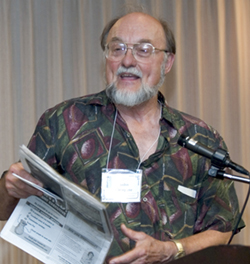 Name: John Senter Compere.
Name: John Senter Compere.
Where I live: Chandler, Ariz.
Where and when I was born: Ellisville, Miss., Oct. 17, 1934. When I tell people I grew up in Mississippi, I usually add, “Please don’t hold that against me. I left as soon as I found out you could!”
Family: Joyce Compere, wife; Layne Starling, daughter; Virginia Starling, granddaughter; LouAnn Vaughn, daughter (husband Scott Vaughn); Padgett, Rachael and Sydney Vaughn, granddaughters; Lee Compere, son; Shelly Baldenegro, daughter (husband Art Baldenegro); Ashley and Lindsey Baldenegro, granddaughters.
Education: Central High School, Jackson, Miss., 1952; Mississippi College, Clinton, Miss., B.A. in English and history, 1956; Southeastern Baptist Theological Seminary, Wake Forest, N.C., bachelor of divinity, 1961; School of Pastoral Care, Baptist Hospital, Winston-Salem, N.C., certificate in pastoral counseling, 1963; Wake Forest University, Winston-Salem, M.A. in psychology, 1969; University of North Carolina, Chapel Hill, Ph.D. in clinical psychology, 1972; Jung Analytic Institute, Zurich, Switzerland, post-doctoral training in psychology, 1977.
Occupation: Clinical psychologist and professional speaker (retired).
Military service: During graduate school, I was a civilian auxiliary chaplain at a North Carolina Air Force radar station.
How I got where I am today: I was ordained at 18 and served as a student summer missionary in Alaska (1952, 1955). I was pastor at rural Baptist churches during college and youth minister at a campus church during seminary, then full-time pastor at two Baptist churches. I left the ministry in 1967 at age 32 and went back to graduate school.
After receiving my Ph.D., I taught psychology at Wake Forest University, 1972-77 and maintained a private practice from 1972-89. I started speaking professionally in 1981 and still speak occasionally on my journey from fifth-generation Southern Baptist minister to atheist.
Where I’m headed: I’m clearly headed where we all are headed, to the oblivion of death, for me, sooner than later. I do not fear it, though I cannot imagine not existing. Until then, I will continue trying to live each day to the fullest, with honesty and kindness to people and animals.
Person in history I admire: Nelson Mandela, a true statesman if ever there was one, and American Revolution-era writer Thomas Paine.
A quotation I like: “The world is my country. To do good is my religion.” (Thomas Paine)
These are a few of my favorite things: Classical music (including good religious music), babies and young children, Yorkshire terriers, cats, well-written editorials, tennis, raquetball, cycling, seeing (or helping) someone live up to his/her potential, Low Country barbecue (vinegar-based sauce), well-delivered oratory, a poignant story, serious programs about cosmology.
These are not: Violence in movies or on TV, people talking loudly on cell phones in public, rap music, auto races, most conservative politicians.
My doubts about religion started: In my freshman year in college. I was already an ordained minister and was preparing to deliver a sermon in a large “First Baptist” church. Out of the blue, I found myself asking if there could possibly be such a thing as eternal punishment for finite “sins.” I had not met or read or talked to anyone who challenged religion and had always taken what I learned in church as the absolute truth.
Once the questions began, I couldn’t stop them. I continued in the ministry and the faith for 14 more years, before I admitted to myself that I no longer believed any of the dogma I had been taught and had been preaching. I knew many of my liberal minister friends had asked some of the same questions I was asking, but they had somehow been able to stay in the ministry, while casting doubt and joking in private about many of the faith-based tenets they were professing in public.
I had to leave the ministry to avoid doing that and becoming what I call “publicly phony and privately cynical.”
Why I’m a freethinker: I’m basically a scientist at heart and believe in evaluating evidence. Once the blinders were off, my study of the bible made it clear to me that this book was anything but a “holy” book. In fact, it’s a horrible book, with a few inspiring passages in it. It’s a collection of myths and suspicious “history” from Bronze Age ignorant people and has little, if any, relevance to the real world of today.
Ways I promote freethought: I’m vice president of the Valley of the Sun FFRF chapter and a member of the Humanist Society of Greater Phoenix. I’ve published a book, Towards the Light: A Fifth-generation Baptist Minister’s Journey from Religion to Reason, and I am asked fairly often to speak on subjects of the various chapters in my book. I’m also one of the early members of the Clergy Project and coordinate the screening process we use with new applicants to our private online site.
September 20, 2012

